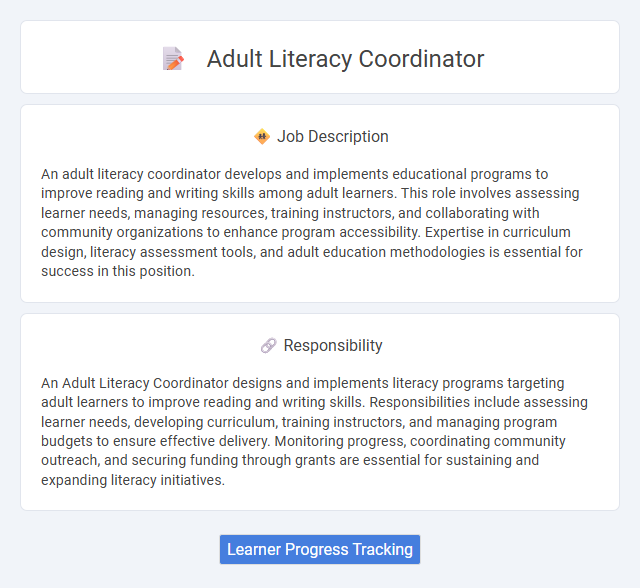
An adult literacy coordinator develops and implements educational programs to improve reading and writing skills among adult learners. This role involves assessing learner needs, managing resources, training instructors, and collaborating with community organizations to enhance program accessibility. Expertise in curriculum design, literacy assessment tools, and adult education methodologies is essential for success in this position.
People with strong organizational skills and a passion for education are likely to thrive as Adult Literacy Coordinators, as the role requires managing programs that support adult learners. Those comfortable working with diverse populations and addressing literacy challenges may find this job particularly suitable. Individuals lacking patience or interpersonal skills might face difficulties in fulfilling the responsibilities effectively.
Qualification
An Adult Literacy Coordinator typically requires a bachelor's degree in education, social work, or a related field, with preference for credentials in adult education or literacy instruction. Extensive experience in curriculum development, program management, and community outreach is essential to effectively support and enhance adult learning programs. Strong communication, organizational skills, and knowledge of adult learning theories are critical qualifications for successful coordination and leadership in literacy initiatives.
Responsibility
An Adult Literacy Coordinator designs and implements literacy programs targeting adult learners to improve reading and writing skills. Responsibilities include assessing learner needs, developing curriculum, training instructors, and managing program budgets to ensure effective delivery. Monitoring progress, coordinating community outreach, and securing funding through grants are essential for sustaining and expanding literacy initiatives.
Benefit
An Adult Literacy Coordinator likely enhances community education by improving literacy rates among adults, which can lead to greater employment opportunities and economic growth. The role probably offers job satisfaction through meaningful work that supports lifelong learning and personal development. It may also provide a collaborative environment with educators and access to resources that foster professional growth.
Challenge
The role of an Adult Literacy Coordinator likely involves navigating the challenge of addressing diverse learner needs while implementing effective instructional strategies. Balancing limited resources and fostering community partnerships may also prove to be demanding aspects of the job. Managing resistance to change and ensuring program accessibility could further contribute to the complexity of this position.
Career Advancement
An Adult Literacy Coordinator manages programs that improve adult reading and writing skills, often collaborating with community organizations and educational institutions. Career advancement opportunities include roles such as program director, education consultant, or nonprofit leadership positions, which require expanded skills in administration, curriculum development, and grant management. Continuous professional development and networking within literacy advocacy groups enhance prospects for higher-level positions and increased impact in adult education.
Key Terms
Learner Progress Tracking
An Adult Literacy Coordinator specializes in learner progress tracking by implementing effective assessment tools and data management systems to monitor individual skill development. They analyze literacy metrics regularly to identify areas needing intervention and tailor instructional strategies accordingly. Maintaining accurate records supports reporting requirements and enhances overall program effectiveness.
 kuljobs.com
kuljobs.com